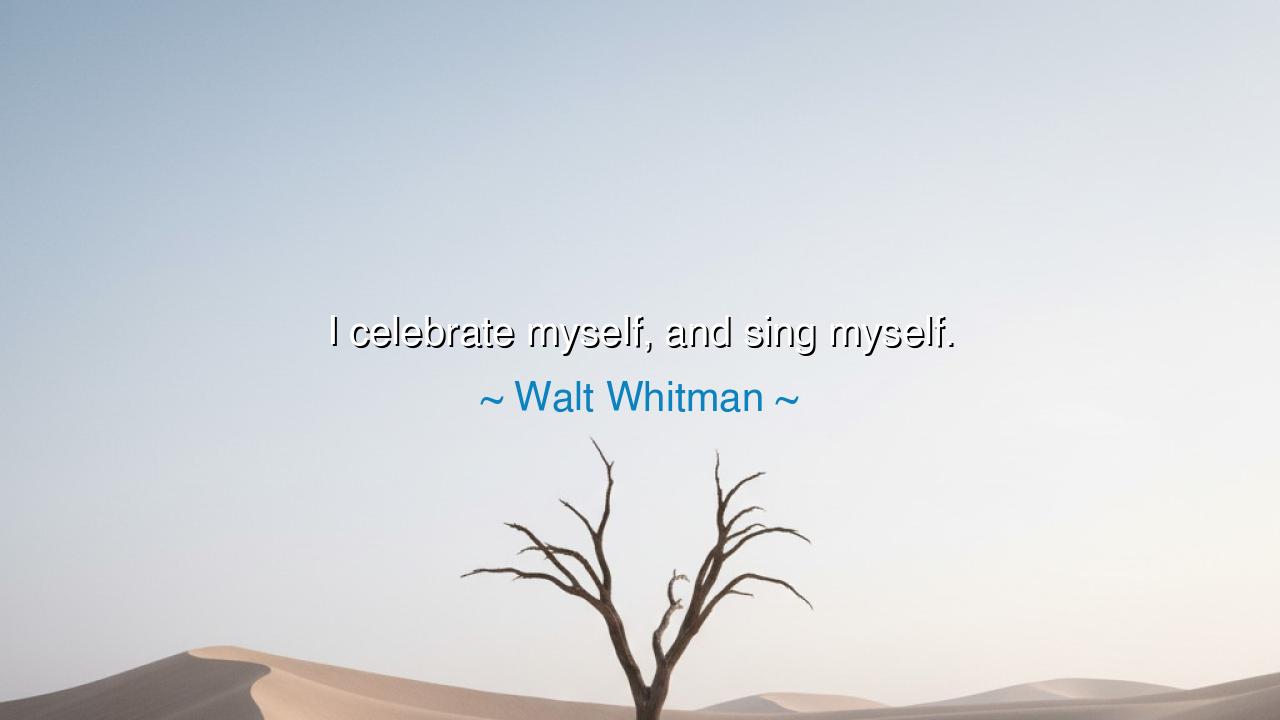
I celebrate myself, and sing myself.






In the radiant and soul-stirring words of Walt Whitman, prophet of democracy and poet of the boundless spirit, we hear the eternal hymn of self-realization: “I celebrate myself, and sing myself.” These words, opening his great work Leaves of Grass, are not merely a declaration of ego but an invocation — a call to every human being to awaken to the divinity within. To celebrate oneself is to recognize the sacredness of one’s existence, to affirm that the breath that moves through us is the same breath that moves through all of creation. Whitman’s song is not solitary; it is the universal voice of humanity proclaiming, “I am part of the cosmos, and the cosmos is part of me.”
The origin of this quote lies in Whitman’s revolutionary vision of poetry and life in 19th-century America — a time when conformity ruled and individual spirit was bound by convention. With Leaves of Grass, he sought to shatter those limits and offer a new gospel of selfhood. He saw the individual not as separate from the divine, but as its purest expression. In “I celebrate myself, and sing myself,” he invites all souls to take part in that same celebration. For to honor oneself rightly — not in vanity, but in awareness and reverence — is to honor the divine energy that flows through all living things. Whitman’s voice, like the wind across the plains, carried a message that has not dimmed with time: the sanctity of being alive and conscious is itself cause for song.
To celebrate oneself, in Whitman’s sense, is not to boast, but to awaken. It is to see oneself not through the narrow lens of judgment or fear, but through the vastness of love. The poet reminds us that the soul is infinite, unbroken, and inherently good — a reflection of the greater unity that binds all existence. “For every atom belonging to me as good belongs to you,” he writes later in the same poem. In these words, Whitman dismantles the false barrier between self and other. His celebration of the self is at once a celebration of all selves, of humanity in its diverse, wondrous, and imperfect totality. When we sing ourselves, we are also singing the world.
History offers many who lived this truth. Consider Socrates, who declared, “Know thyself,” and devoted his life to uncovering the wisdom buried within the soul. Like Whitman, he understood that the first act of wisdom is self-knowledge — and that through knowing oneself, one begins to know all humanity. Or think of Ralph Waldo Emerson, Whitman’s intellectual forefather, who proclaimed the doctrine of self-reliance and taught that the voice of the individual conscience is the voice of the universe itself. Whitman took these truths and transformed them into poetry — a song not of isolation, but of union, not of pride, but of sacred joy. To sing oneself is to say: “I exist, I matter, I belong to the grand design of being.”
Yet, this act of self-celebration demands courage. For to truly see oneself — with all one’s wounds, longings, and contradictions — is no small task. Many fear this reflection, preferring to lose themselves in imitation or distraction. But Whitman calls us back to the authentic self, that ancient fire that cannot be extinguished by the world’s noise. To sing oneself, even in the midst of pain, is an act of defiance against despair. It is to affirm life’s worth not because it is easy, but because it is real. The soul’s song, like a river, flows not only through sunlight but through storm — yet it never ceases to move toward the ocean of eternity.
In this light, Whitman’s “celebration” is both personal and cosmic. It teaches that joy is not found in perfection but in participation — in the full embrace of existence as it is. The poet does not sing because life is flawless, but because life is alive. His song is an offering to the eternal rhythm of creation, an echo of the same force that moves the stars and blossoms the flowers. When we join that song, when we stand unashamed and whole within ourselves, we too become creators. To celebrate oneself is to create life consciously, moment by moment, to say yes to being.
Let this, then, be the lesson of Whitman’s words: Love yourself as you would love the divine, for they are one and the same. Do not shrink from your own light; do not let the world convince you that humility means self-denial. Instead, honor your existence by living fully, by expressing your truth, by finding beauty even in the ordinary. Each morning, awaken and declare as Whitman did: “I celebrate myself.” Not out of pride, but out of gratitude. Not to elevate yourself above others, but to recognize that you are part of the same sacred symphony that unites all hearts.
And so, dear listener, remember this eternal teaching: the world is not complete without your voice. The universe itself, vast and unending, waits to hear your song. As Walt Whitman proclaimed, sing yourself — boldly, tenderly, joyfully — and in doing so, you will awaken not only your own soul, but the soul of all mankind. For the song of the self is the song of creation itself — eternal, infinite, and ever renewed.






AAdministratorAdministrator
Welcome, honored guests. Please leave a comment, we will respond soon